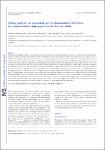Dietary patterns are associated with cardiometabolic risk factors in a representative study population of German adults
Heidemann, Christin
Scheidt-Nave, Christa
Richter, Almut
Mensink, Gert
Studies that investigated complex actual eating behaviours of the general population and their relation to cardiometabolic risk markers are sparse. We aimed to identify dietary patterns within a nationally representative sample of 4025 German adults by factor analysis based on validated dietary history interviews. Furthermore, we evaluated associations of the derived dietary patterns with abnormalities clustered within the metabolic syndrome and related metabolic markers by logistic regression models and ANCOVA. A high adherence to the ‘processed foods’ pattern reflected a high intake of refined grains, processed meat, red meat, high-sugar beverages, eggs, potatoes, beer, sweets and cakes, snacks and butter, whereas a high adherence to the ‘health-conscious’ pattern represented a high intake of vegetables, vegetable oils, legumes, fruits, fish and whole grains. For subjects in the highest compared with those in the lowest quintile of the processed foods pattern, the occurrence of abdominal obesity was 88 (95 % CI 31, 169) % higher, hypertension was 34 (95 % CI − 4, 86) % higher, hypertriacylglycerolaemia was 59 (95 % CI 11, 128 ) % higher and the metabolic syndrome was 64 (95 % CI 10, 143) % higher when adjusted for age, sex, energy intake, socio-economic status, sport activity and smoking. Furthermore, subjects in the highest quintile had statistically significantly higher uric acid concentrations and lower folate concentrations (P for trend < 0·05). In contrast, subjects in the highest quintile of the health-conscious pattern had a 30 (95 % CI 10, 46) % lower occurrence of hypertension, higher folate concentrations and lower homocysteine and fibrinogen concentrations (P for trend < 0·05). These data strengthen the findings from non-representative studies and emphasise the importance of healthy overall food patterns for preventing metabolic disturbances.
No license information

